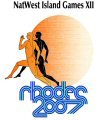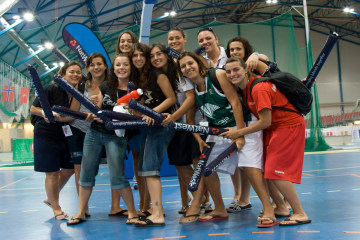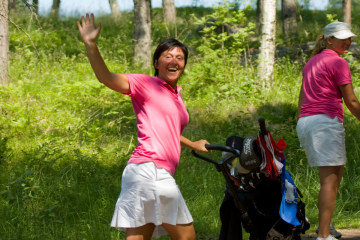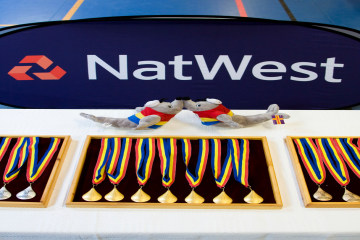
NatWest Island Games XII - Rhodes 2007
30th June - 6th July 2007
Rhodes 2007 was bigger than the Winter Olympics
The organisers of the 2007 NatWest Island Games in Rhodes faced many challenges. Not least of these of was the necessity of staging a major sporting event, which is now bigger than the Winter Olympics, in the middle of the Island’s tourist season when the population doubles to over 200,000.
Each successive venue throws up its own series of difficulties to be overcome but those facing Rhodes were probably more extensive than most. Once it was allocated the Games the first challenge was to decide which sports facilities needed to be built and which existing ones required an upgrade. The organising committee spent many hours meeting with the respective mayors and officials to make plans but were dependant on the municipalities themselves bringing them all to fruition.
Two other challenges centred on sponsorship and volunteers. Although the main sponsor – in the form of NatWest – was already in place others needed to be sought. However, large sponsorships of this nature are not the general custom in Rhodes and the chair of the organising committee, Lee Minaidis, and her colleagues had to use all their skills of persuasion to bring businesses on board.
Volunteering on such a large scale had never previously been required in Rhodes and with the number of competitors having risen by 50% in the past six years the Games organisers were faced with having to enlist more helpers than any other island previously – at a time when many residents were actively engaged in the tourist industry.
One by one the problems were overcome, even if work on some venues was only being completed as the Games began. Around 1,500 volunteers were recruited - many of them local school children who were very proud to be involved with the medal ceremonies and the 2007 Rhodes NatWest Island Games came under starter’s orders.
Said Mrs Minaidis: ‘I will never forget the opening ceremony when over 3,000 competitors and officials entered the ancient stadium where athletes competed over 2,000 years ago. It was an impressive sight to see them, each island team with their own colours, seated in the stadium.’
The stunning opening ceremony saw performers walking on stilts and hurling ‘balls of fire’ into the air to tell the story of Zeus in the creation of the world. It all took place against the backdrop of the remains of the Hellenistic temples including the Temple of Apollo
Mrs Minaidis added: ‘We all experienced a sense of satisfaction when we finally saw the sports venues in operation. One of our main goals in hosting the Games was to acquire, at last, an athletic infrastructure which up to then had been incomplete. This is the legacy of the Games to Rhodes and will benefit its people for years to come.
‘It was a joy to see the enthusiasm of our volunteers, young and old alike. Those who finally signed on to serve did so with their hearts – from the little children who were maids and pages in the medal ceremonies to the older people in the press centre and sports venues. This acquired sense of volunteering and service to the community, I believe, is also a legacy of the Games.’
While the Rhodes organisers had to deal with a number of obstacles, the main concern facing the majority of competitors – particularly those from the more temperate islands – was how to cope with the extreme heat. The programme was arranged in such a way so that, where possible, sports started early in the morning and then had a break during the main heat of the day before resuming and continuing late into the evening.
Athletes found their own ways of training for the anticipated high temperatures. Some of Guernsey’s distance runners and triathletes sweated it out in a greenhouse with a local pharmacy donating £1,000 worth of sunscreen. Guernsey middle-distance runner Lee Merrien warned his team mates: ‘It’s gonna be so hot out there, it’s crucial to cover up’ – and hot it was with the thermometer on some occasions hovering between 43 and 47 degrees centigrade!
Jersey’s medical adviser, Dr. Adam Garnett, reminded his team in advance about the importance of staying hydrated. He said it was necessary to drink about eight litres a day and to make sure it was the right kind of fluid to replace electrolytes. Jersey also laid on ice baths and cold showers after competitors had finished their events.
The Jersey contingent went through 1,000 kilos of ice in aiding competitors with their recovery, but it all proved worthwhile as Jersey topped the medals table. Their medal tally of 30 golds, 35 silvers and 27 bronze put them six golds ahead of the Faroe Island who were second, with Guernsey one gold medal behind in third place. Gotland, Rhodes and the Isle of Man completed the top six. A total of 21 out of the 25 competing islands went home with at least one medal.
The Channel Island teams have a proud record in the Games with either Jersey or Guernsey being the leading Island at the last four events and Jersey’s position at the top of the 2007 medals table represented the fifth time they had been there – a Games record. The last non-Channel Island team to take top honours was Gotland in 1999.
Special mention should be made of the Island which finished in seventh position. Menorca had become the 25th member of the International Island Games Association, having been voted in at the annual meeting during the previous gathering in Shetland. The Spanish Island made its presence felt in its first Games and finished with a haul of 11 golds. Their contingent numbered 170 including 120 competitors and with a climate similar to that of Rhodes they had no difficulty coping with the heat.
Menorca’s entry into the international arena had its origins in the Isle of Man. Team manager at Rhodes was Dr. Antonio Olives who is a friend of a former Lieutenant Governor of the Isle of Man, Air Marshal Ian Macfadyen. The Air Marshal – who has a summer home in Menorca – is a friend of Dr. Olives and having been Governor of the Isle of Man when it hosted the 2001 Games expressed the opinion that it was something to which Menorca could aspire.
Almost 200 officially accredited journalists were present to report the week’s events. As well as the record-breakers, the near misses and the hard luck tales there were many unusual or human interest stories to cover.
They were able to report the fact that the 200-strong Gibraltar contingent had arrived in an aircraft normally used to transport the stars of the Real Madrid and Barcelona football clubs across Europe; that for the first time in the 22 years history of the Games the swimming competitions had taken place in an outdoor pool; and on Bermudan Terrance Armstrong who won the men’s half marathon and had enough left over to compete in that evening’s cycling criterium.
Some of the Spanish football magic must have rubbed off on Gibraltar as they won the football final with victory over Rhodes. Aland triumphed in the women’s event with Prince Edward Island runners-up.
Beach volleyball made its debut in the Games with the Cayman Islands and Menorca winning the first ever golds in this particular event. Saaremaa has always been very strong at the indoor version of volleyball and took two gold medals with the Faroe Islands runners-up in both.
Judo was back after a gap of 12 years, while one individual competitor returning after a long lay-off was the Isle of Man’s Elliot Baxter. However, his four years’ absence didn’t seem to have done him any harm at all as he resumed his dominance of the mountain bike events. Another competitor whose luggage was considerably heavier going home was Jersey’s Lauren Therin who won the discus as well as the shot and javelin to claim a unique treble.
Just to prove that age in no barrier in the Games, Alice Loveridge from Guernsey completed a golden double in the table tennis individual events on the day she turned 13 while there was a shooting silver medal for team mate Ruth O’Rorke at the age of 83. Shooting also provided another remarkable statistic with Jersey’s pistol exponent Dave Ward pocketing his 50th Games medal!
When all the medals had been handed out it was time to relax at the final night party in its idyllic setting on the waterfront opposite mediaeval monuments and under the palm trees. Competitors and officials from all over the world talked and danced the night away now that their responsibilities had almost ended.
One person who was saying goodbye to the Games, in an organisational sense at least, was the retiring chairman of the International Island Games Association, Archdeacon Brian Partington. He led the Isle of Man’s successful bid to host the event in 2001 and then became chairman of the organising committee.
He was vice-chairman of the IGA for the next four years before serving as chairman from 2005-7. Although he has handed over the reins to Aland’s Jorgen Pettersson, Brian will not be losing touch with the NatWest Island Games as the Association’s annual meeting elected him an honorary life member.
Archdeacon Partington said his term as chairman had coincided with a marvellous week of sport and the rising standards continued to amaze him. He added: ‘The facilities get better and the friendly spirit between competitors and islands has become one of the best development projects any community could enjoy. Rhodes is another boost to this amazing success story.’
Jorgen Pettersson is to preside over a changing focus within the executive committee. Each of the six members will have responsibility for liaising with three of the Games sports and a review will be undertaken on the 2007 Games to improve and develop the competition for the future.
In those circumstances it is fitting that the last word on the Rhodes Games should go to the new chairman. Said Mr. Pettersson: ‘One thing that has been more evident than ever before is the legacy left behind. Rhodes now has new facilities for archery, athletics and shooting, improvements at tennis, several football pitches and the golf course. There are new venues for judo and table tennis together with new courses for cycling and mountain biking.
‘All of the Games sports will benefit from the first class equipment that has been provided, an excellent example being the Laser dinghies and sailboards. Maybe even more important is the experience gained by the organisers as many officials now have the experience of staging a major sporting event. We hope to hear of many more such events in the future.’
Colin Brown
Sports Held
Below is a list of sports held at these games. Once results are available they will be linked below.
Members Attending
For a profile about a member simply click their name below.
Photos
To view a larger version of one of the following photos simply click the thumbnail.







